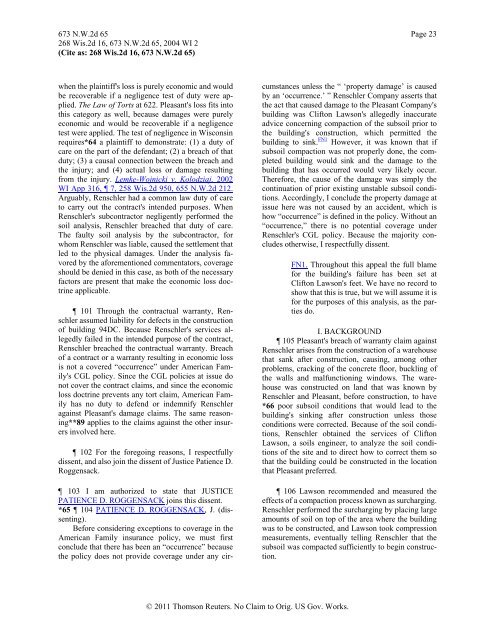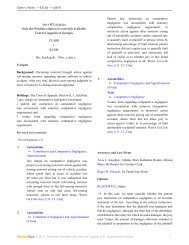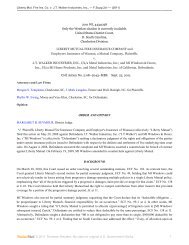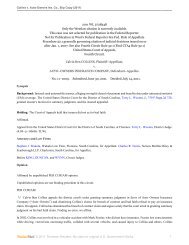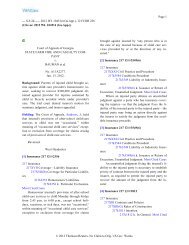American Family Mutual Ins. Co. v. American Girl - Insurance ...
American Family Mutual Ins. Co. v. American Girl - Insurance ...
American Family Mutual Ins. Co. v. American Girl - Insurance ...
Create successful ePaper yourself
Turn your PDF publications into a flip-book with our unique Google optimized e-Paper software.
673 N.W.2d 65 Page 23<br />
268 Wis.2d 16, 673 N.W.2d 65, 2004 WI 2<br />
(Cite as: 268 Wis.2d 16, 673 N.W.2d 65)<br />
when the plaintiff's loss is purely economic and would<br />
be recoverable if a negligence test of duty were applied.<br />
The Law of Torts at 622. Pleasant's loss fits into<br />
this category as well, because damages were purely<br />
economic and would be recoverable if a negligence<br />
test were applied. The test of negligence in Wisconsin<br />
requires*64 a plaintiff to demonstrate: (1) a duty of<br />
care on the part of the defendant; (2) a breach of that<br />
duty; (3) a causal connection between the breach and<br />
the injury; and (4) actual loss or damage resulting<br />
from the injury. Lemke-Wojnicki v. Kolodziaj, 2002<br />
WI App 316, 7, 258 Wis.2d 950, 655 N.W.2d 212.<br />
Arguably, Renschler had a common law duty of care<br />
to carry out the contract's intended purposes. When<br />
Renschler's subcontractor negligently performed the<br />
soil analysis, Renschler breached that duty of care.<br />
The faulty soil analysis by the subcontractor, for<br />
whom Renschler was liable, caused the settlement that<br />
led to the physical damages. Under the analysis favored<br />
by the aforementioned commentators, coverage<br />
should be denied in this case, as both of the necessary<br />
factors are present that make the economic loss doctrine<br />
applicable.<br />
101 Through the contractual warranty, Renschler<br />
assumed liability for defects in the construction<br />
of building 94DC. Because Renschler's services allegedly<br />
failed in the intended purpose of the contract,<br />
Renschler breached the contractual warranty. Breach<br />
of a contract or a warranty resulting in economic loss<br />
is not a covered “occurrence” under <strong>American</strong> <strong>Family</strong>'s<br />
CGL policy. Since the CGL policies at issue do<br />
not cover the contract claims, and since the economic<br />
loss doctrine prevents any tort claim, <strong>American</strong> <strong>Family</strong><br />
has no duty to defend or indemnify Renschler<br />
against Pleasant's damage claims. The same reasoning**89<br />
applies to the claims against the other insurers<br />
involved here.<br />
102 For the foregoing reasons, I respectfully<br />
dissent, and also join the dissent of Justice Patience D.<br />
Roggensack.<br />
103 I am authorized to state that JUSTICE<br />
PATIENCE D. ROGGENSACK joins this dissent.<br />
*65 104 PATIENCE D. ROGGENSACK, J. (dissenting).<br />
Before considering exceptions to coverage in the<br />
<strong>American</strong> <strong>Family</strong> insurance policy, we must first<br />
conclude that there has been an “occurrence” because<br />
the policy does not provide coverage under any cir-<br />
© 2011 Thomson Reuters. No Claim to Orig. US Gov. Works.<br />
cumstances unless the “ ‘property damage’ is caused<br />
by an ‘occurrence.’ ” Renschler <strong>Co</strong>mpany asserts that<br />
the act that caused damage to the Pleasant <strong>Co</strong>mpany's<br />
building was Clifton Lawson's allegedly inaccurate<br />
advice concerning compaction of the subsoil prior to<br />
the building's construction, which permitted the<br />
building to sink. FN1 However, it was known that if<br />
subsoil compaction was not properly done, the completed<br />
building would sink and the damage to the<br />
building that has occurred would very likely occur.<br />
Therefore, the cause of the damage was simply the<br />
continuation of prior existing unstable subsoil conditions.<br />
Accordingly, I conclude the property damage at<br />
issue here was not caused by an accident, which is<br />
how “occurrence” is defined in the policy. Without an<br />
“occurrence,” there is no potential coverage under<br />
Renschler's CGL policy. Because the majority concludes<br />
otherwise, I respectfully dissent.<br />
FN1. Throughout this appeal the full blame<br />
for the building's failure has been set at<br />
Clifton Lawson's feet. We have no record to<br />
show that this is true, but we will assume it is<br />
for the purposes of this analysis, as the parties<br />
do.<br />
I. BACKGROUND<br />
105 Pleasant's breach of warranty claim against<br />
Renschler arises from the construction of a warehouse<br />
that sank after construction, causing, among other<br />
problems, cracking of the concrete floor, buckling of<br />
the walls and malfunctioning windows. The warehouse<br />
was constructed on land that was known by<br />
Renschler and Pleasant, before construction, to have<br />
*66 poor subsoil conditions that would lead to the<br />
building's sinking after construction unless those<br />
conditions were corrected. Because of the soil conditions,<br />
Renschler obtained the services of Clifton<br />
Lawson, a soils engineer, to analyze the soil conditions<br />
of the site and to direct how to correct them so<br />
that the building could be constructed in the location<br />
that Pleasant preferred.<br />
106 Lawson recommended and measured the<br />
effects of a compaction process known as surcharging.<br />
Renschler performed the surcharging by placing large<br />
amounts of soil on top of the area where the building<br />
was to be constructed, and Lawson took compression<br />
measurements, eventually telling Renschler that the<br />
subsoil was compacted sufficiently to begin construction.


